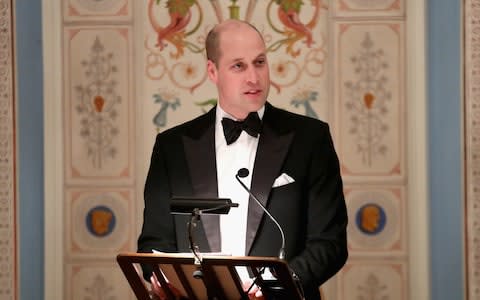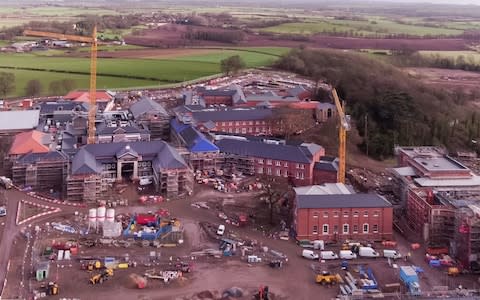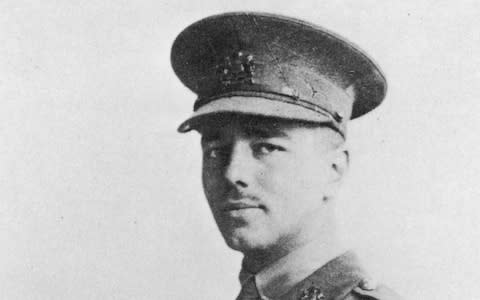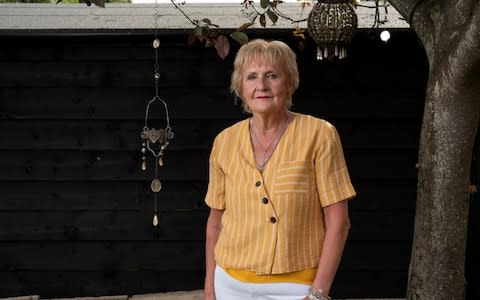A&E nurse named 'next Wilfred Owen' after winning Prince William's poetry prize
An A&E nurse who submitted her first poem to a national competition in the hope of helping traumatised war heroes will have her work read aloud by the Duke of Cambridge after being voted the "next Wilfred Owen".
Debbie Lawson, a Telegraph reader, said she wrote about PTSD to raise awareness of the "brave, brave people" she looks after, sending her work to a competition to find the war poets of the modern age.
Her lines, which impressed high-profile judges and the voting public alike, have now seen her crowned the winner of the competition, with her poem to be mounted on the wall forever more at the new Defence and National Rehabilitation Centre.
Mrs Lawson, who works as a PTSD counsellor and comes from a military family, said she was “overwhelmed and so moved” to have her work recognised, after being inspired by the true stories told to her by a patient who had seen his comrades killed in Afghanistan.
Her poem, entitled One For the Team, took her just ten minutes to write, before she submitted it to the "Poem to Remember" competition without telling her family after reading about the DNRC project in the news.

Hoping to further public understanding of PTSD through the poem, she has since heard from sufferers thanking her for “talking about the unknown enemy that we all carry”.
Mrs Lawson and her family will visit the new DNRC facility for its official handover on Thursday, where the Duke of Cambridge will read her poem to an audience before it is mounted on the walls in perpetuity.
The competition, launched by the Duke in February, was inspired by the Great War poets, marking the 100th anniversary of the end of the First World War and designed to “discover the next generation of poems that reflect on humankind’s ability to triumph over adversity”.
More than 5,000 people entered, writing about subjects from the Grenfell Tower tragedy and Manchester Arena terror attack to memories of relatives who served in the Armed Forces.

These were whittled down to the five best entries by a panel of judges, chaired by historian Dan Snow and including broadcaster Stephen Fry, former SAS soldier Andy McNab, ex-Marine JJ Chalmers, several writers and the 7th Duke of Westminster.
Published online, the final winner of the £2,000 prize was chosen by the public, with Mrs Lawson winning 49 per cent of the vote.
The Duke of Cambridge has previously hailed the finalists for the “powerful new perspectives on service, conflict and how people can face the most difficult adversities”, saying he is “greatly looking forward to reading the winning entry”.

Mrs Lawson, a 63-year-old A&E nurse at Stoke Mandeville Hospital, said: “If just one person reads my poem and understands from it what these people are going through, then I will be delighted.”
She attributed the success of her poem to writing on a subject she knows so well, writing it in ten minutes and sending it off after reading about the DNRC competition online.
“It’s the first thing I’ve ever submitted to a competition,” said Mrs Lawson. “I guess as a teenager I used to write poems as we all did, and I’ve written funny verses for the kids, but this is the first thing I’ve written seriously.

“Of course you tend to think your family will always support you, and even if you wrote a William McGonagall they’d still think it was good.
“When I got the email to say I was shortlisted, I was very overwhelmed and excited: it’s so humbling to think those people on the judging panel have read something I wrote.
“I’ve been absolutely overwhelmed by the response to it, and what has meant a lot to me is that people suffering from this awfulness have taken the time to get in touch with me to tell me that it helped them."

Mrs Lawson’s husband Alan served for 42 years in the RAF, with the couple living together on military bases for much of their married life, while her daughter's fiancée has undertaken multiple tours in Afghanistan with the Special Forces of the Australian military.
‘One for the Team’ is based on the true story of one of the PTSD sufferers she has worked with as a counsellor: a former soldier who carried the bodies of his dead friends to base after their tank crew was attacked in Afghanistan.
Asked how it felt to now be compared with the Great War poets, Mrs Lawson said: “I don’t think I’m among those ranks but it’s very, very humbling to have my poem discussed alongside a person like Owen, Sassoon or Kipling.
“It’s also a great honour to be able to tell the story for these brave, brave people, and to be allowed to tell that story. It’s very humbling.”

One for the Team, by Debbie Lawson
I keep seeing you mate, intact and laughing,
holding up your baby to make us smile.
I keep hearing you mate, joking, urging, 'come on lads keep together, don't step on the cracks it brings bad luck’.
‘Keep it tight boys, we'll be home by the footy season’.
We carried you home, silent and broken, you really took one for the team that day.
Your dad stood with pride head high, don't cry, don't cry.
Lucy took the flag, a token for the broken. The baby will have it one day.
They'll go to the wall to see your name, a game, 'let's find daddy's name'
but I keep seeing you mate, my shrink says you're not there, that makes us laugh doesn't it?
What do they know.

 Yahoo News
Yahoo News 